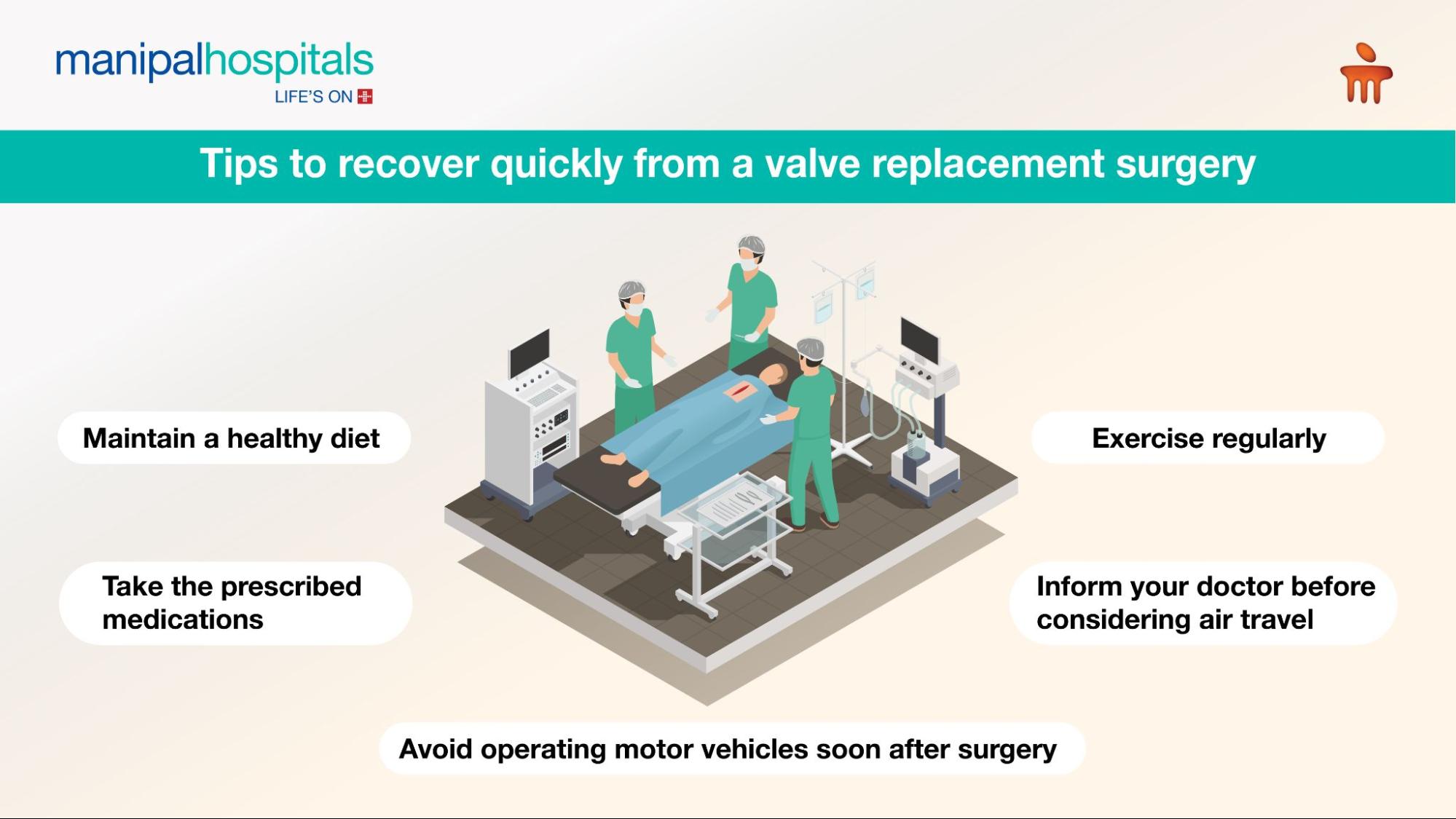The human heart valves are susceptible to various medical problems that can affect the heart’s functioning and disrupt normal circulatory patterns. About 2.5% of people have at least mild valvular heart disease, and the frequency rises with age. The most prevalent valve diseases in community and hospital settings are mitral regurgitation and aortic stenosis. 33.4 million individuals worldwide are affected by valve disease. The majority of aortic valve diseases are mechanical issues that eventually need to be surgically repaired to alleviate symptoms and lower the chance of health consequences. In this blog post, we explore the concept of valve replacement surgery and quick tips for a swift recovery.
Synopsis
What is Valve Replacement Surgery?
Valve Replacement Surgery is an intricate procedure that involves replacing damaged or diseased valves with mechanical or biological ones. It’s a lifesaving procedure that helps overcome severe heart disease and enhances the patient’s quality of life.
Who needs to get Valve Replacement Surgery?
Valve replacement or repair surgery is performed to address the issues brought on by one or more damaged heart valves.
The following signs indicate a disease or damage to your heart valve(s) or heart failure:
-
Lightheadedness
-
Heart palpitations
-
Oedema (swelling) in the abdomen (belly), ankles, or feet
-
Gaining weight quickly as a result of fluid retention
Consult our cardiologist in Dhakuria Kolkata if you need a heart valve replacement.
Preparing yourself for the surgery
In addition to a comprehensive physical examination, medical history, and sometimes blood tests, a consent form must be completed before surgery. Eight hours of fasting are required before starting therapy. Notify your healthcare provider if you are planning a baby, have a history of bleeding issues, or are allergic to any drugs. Inform your doctor about any use of vitamins, herbs, supplements, or prescriptions. Blood clotting time may be measured with blood testing. Tell your practitioner if you have a pacemaker. Give up smoking to enhance healing and well-being.
What exactly happens during the surgery?
Heart valve replacement or repair treatments necessitate hospitalisation. After taking off jewellery and donning a gown, the patient is put on the operating table and given IV fluids and medication injections, and their vital signs are tracked throughout the process. Monitoring breathing, blood pressure, heart rate, and oxygen saturation is done by anesthesiologists. An implanted transesophageal echocardiography probe is attached to a ventilator. After stopping the heart, blood is pumped through tubes. The damaged heart valves are replaced with healthy ones. The heart's operation and leak detection are observed following the surgery. It's possible to implant pacemaker wires. Tubes are put in to drain fluids, and the sternum is sewn back together.
Recovery After Surgery
After surgery, patients are brought to a recovery room while being closely watched in an intensive care unit for critical data. Patients under anaesthesia could have a tube in their throat that is attached to a ventilator. To reduce discomfort and manage blood pressure and cardiac issues, painkillers and intravenous medications may be used. It's important to keep the surgery site dry and clean at home, and you should only drive with your doctor's permission. Symptoms including fever, redness, swelling, bleeding, drainage, increasing discomfort, difficulty breathing, and weakness should be taken seriously.
Consult our cardiology hospital in Dhakuria if you need aortic valve replacement surgery.
Lifestyle Modifications: Tips for Quick Recovery

-
After a Valve Replacement, maintaining a healthy diet is crucial for long-term recovery. Recommended foods include lean proteins like poultry, fish, tofu, and legumes; whole grains like brown rice, quinoa, and whole wheat; and fruits and vegetables rich in vitamins and antioxidants.
-
Avoid foods high in sodium and unhealthy fats, limit sugary snacks and beverages, and moderate coffee and alcohol consumption. Exercise is a key component of a comprehensive recovery plan, with guidelines for walking, aerobic exercise, and avoiding heavy lifting for 6-8 weeks.
-
Medications are essential for supporting the healing process and maintaining cardiovascular health. Anticoagulants (blood thinners) help prevent blood clots and reduce the risk of stroke. Antiplatelet agents, beta-blockers, ACE inhibitors, statins, and pain medications may be prescribed to manage blood pressure and improve overall heart function.
-
Travel after a valve replacement can be a feasible and enjoyable aspect of life, but it's important to consider certain factors and potential restrictions to ensure a safe and comfortable journey. General guidelines for travel include not operating a motor vehicle immediately after surgery due to the impact on chest muscles.
-
Air travel plans should be discussed with your healthcare team, especially if flying, as changes in altitude can affect the cardiovascular system. Driving restrictions should be followed until you fully regain strength and mobility and your healthcare provider approves them.
Conclusion
It is important to understand that individual results may differ and that age, general health, and postoperative care compliance are among the factors affecting heart valve surgery's effectiveness. However, many people who have Heart Valve Surgery go on to experience vibrant, meaningful lives for many years following the procedure, provided they receive the right medical care, have a positive outlook, and commit to living a heart-healthy lifestyle. Always seek the advice of expert medical professionals at Manipal Hospitals for individualised instructions tailored to your unique needs and health situation.
FAQ's
You might experience chest pain, dizziness, fatigue, profuse sweating, restlessness, etc. as an indication of your valve being damaged
Oral medications can improve your lifestyle, but Valve Replacement Surgery has an overall better impact on your lifestyle.
You will require adequate rest for a few days, and then you can resume your routine with a few modifications as advised by your doctor.
A properly balanced diet, exercise, and adopting a healthy lifestyle are all it takes to maintain proper cardiovascular health.
Visit the hospital's website or contact the Cardiology Department for further assistance.



















 6 Min Read
6 Min Read










